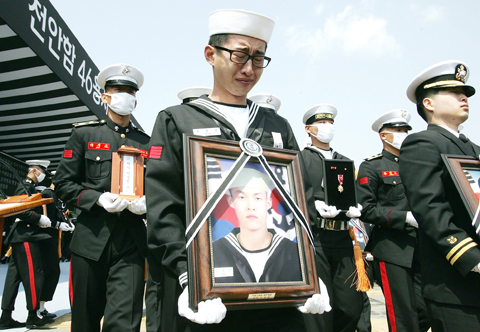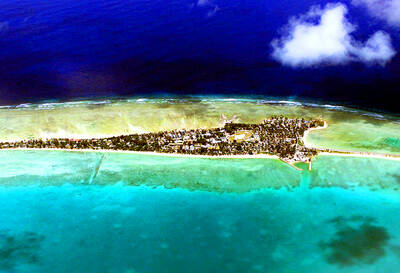South Korea laid to rest 46 sailors killed in the sinking of a navy warship during an emotional and solemn burial yesterday, as officials vowed retaliation against those responsible for what many believe was a North Korean attack.
Wailing families placed white chrysanthemums, burned incense and bowed in front of the framed photos of the men before their cremated ashes were buried at the country’s national cemetery in the central city of Daejeon. Buddhist and Christian clergy offered prayers, a navy band played a dirge and troops fired a rifle salute.
Some mothers clad in black traditional Korean mourning dress wailed uncontrollably, touching photos of their sons and their urns wrapped in white cloth.

PHOTO: EPA
“It’s your mother! Please answer me! Please answer me!” one mother shouted.
The sailors went down with the 1,200-tonne Cheonan near the tense western sea border with North Korea on March 26 shortly after it was split in two by what investigators believe was an underwater blast from outside the ship.
Fifty-eight people survived the disaster, and the bodies of 40 of the sailors were recovered, while six others remain unaccounted for and are presumed dead. Hair and nails from the missing were burned and those ashes were among those buried yesterday. Seamen and air force pilots in South Korea are required to submit bits of hair and nail in case they die in action and their remains cannot be recovered to ensure there is something to be buried in line with Confucian tradition.
South Korea has not directly blamed its Cold War-era rival North Korea, but suspicion has focused on Pyongyang given its history of provocations and attacks on the South. South Korea’s defense minister said this week the blast was most likely caused by a torpedo attack. North Korea has denied any role.
The ship’s two main pieces have been hoisted, with investigators examining them to find any clues to the cause of the blast. However, analysts such as Paik Hak-soon at the private Sejong Institute said the exact reason may never be known.
Earlier yesterday, sirens blared across South Korea when the funeral started at the 2nd Fleet headquarters in Pyeongtaek, south of Seoul, the ship’s home base. Warships anchored there sounded whistles, and seamen aboard saluted when the vehicles carrying the ashes left for the cemetery. About 3,000 white and black balloons were released into the air.
A somber South Korean President Lee Myung-bak and his wife, Kim Yoon-ok — who joined 2,800 mourners at the ceremony — paid homage to the sailors, while buglers played taps. Former South Korean president Chun Doo-hwan, lawmakers and military leaders also paid respects to those who died in one of South Korea’s worst naval disasters.
The name of each sailor was read out while Lee, clad in a black suit and tie, placed military decorations on a giant altar below photos of each man. They were all posthumously promoted by one rank earlier this week.
“We cannot forgive this and must not forgive it and must not forget it,” Navy Chief of Staff Kim Sung-chan said in a speech at the funeral. “We will never sit idly by in the face of whoever inflicted huge pain to our people.”
Military retaliation against Pyongyang, however, is considered unlikely as it could lead to major conflict and frighten away investors at a time when South Korea is recovering fast from the global financial meltdown and prepares to hold a summit of leaders from the G20 in November.
“A military response is both unrealistic and impossible,” said Kim Yong-hyun, a North Korea expert at Seoul’s Dongguk University. “That would further deepen military tension on the Korean peninsula.”
The Cheonan was on a routine patrol before it sank near the disputed western sea border, a scene of three bloody sea battles between the rival Koreas that remain locked in a state of war since their 1950 to 1953 conflict ended in a truce instead of a peace treaty.
North Korea has waged a slew of attacks against South Korea, including a 1987 downing of a South Korean passenger plane that killed all 115 people on board, one of the reasons the country is suspected of involvement. South Korea plotted militarily retaliations in some cases, but the plans were never carried out.
In central Seoul people gathered yesterday at a plaza to remember the Cheonan sailors, placing chrysanthemums on an altar where photos of the dead were placed.
“I feel empty,” said mourner Lee Yoon-suk, tears rolling down her cheeks. “I truly hope they rest in peace in heaven.”
One of the pictures drew special interest as accumulated rainwater that had fallen on Tuesday and Wednesday dripped over it.
On-lookers paid their respects by wiping the water from the sailor’s face, telling him not to cry.
Flags in South Korea are flying at half-staff and many government buildings in Seoul have hung large black-and-white placards reading: “We will not forget your honorable sacrifice.”

DISASTER: The Bangladesh Meteorological Department recorded a magnitude 5.7 and tremors reached as far as Kolkata, India, more than 300km away from the epicenter A powerful earthquake struck Bangladesh yesterday outside the crowded capital, Dhaka, killing at least five people and injuring about a hundred, the government said. The magnitude 5.5 quake struck at 10:38am near Narsingdi, Bangladesh, about 33km from Dhaka, the US Geological Survey (USGS) said. The earthquake sparked fear and chaos with many in the Muslim-majority nation of 170 million people at home on their day off. AFP reporters in Dhaka said they saw people weeping in the streets while others appeared shocked. Bangladesh Interim Leader Muhammad Yunus expressed his “deep shock and sorrow over the news of casualties in various districts.” At least five people,

ON THE LAM: The Brazilian Supreme Court said that the former president tried to burn his ankle monitor off as part of an attempt to orchestrate his escape from Brazil Former Brazilian president Jair Bolsonaro — under house arrest while he appeals a conviction for a foiled coup attempt — was taken into custody on Saturday after the Brazilian Supreme Court deemed him a high flight risk. The court said the far-right firebrand — who was sentenced to 27 years in prison over a scheme to stop Brazilian President Luiz Inacio Lula da Silva from taking office after the 2022 elections — had attempted to disable his ankle monitor to flee. Supreme Court judge Alexandre de Moraes said Bolsonaro’s detention was a preventive measure as final appeals play out. In a video made

It is one of the world’s most famous unsolved codes whose answer could sell for a fortune — but two US friends say they have already found the secret hidden by Kryptos. The S-shaped copper sculpture has baffled cryptography enthusiasts since its 1990 installation on the grounds of the CIA headquarters in Virginia, with three of its four messages deciphered so far. Yet K4, the final passage, has kept codebreakers scratching their heads. Sculptor Jim Sanborn, 80, has been so overwhelmed by guesses that he started charging US$50 for each response. Sanborn in August announced he would auction the 97-character solution to K4

SHOW OF FORCE: The US has held nine multilateral drills near Guam in the past four months, which Australia said was important to deter coercion in the region Five Chinese research vessels, including ships used for space and missile tracking and underwater mapping, were active in the northwest Pacific last month, as the US stepped up military exercises, data compiled by a Guam-based group shows. Rapid militarization in the northern Pacific gets insufficient attention, the Pacific Center for Island Security said, adding that it makes island populations a potential target in any great-power conflict. “If you look at the number of US and bilateral and multilateral exercises, there is a lot of activity,” Leland Bettis, the director of the group that seeks to flag regional security risks, said in an